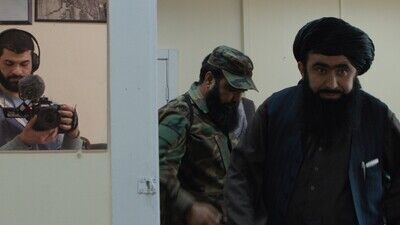
I imagine many will see “Hollywoodgate” because they’re curious about what the Taliban’s seizure of this base looked like. But they’ll also notice the glaring absence of the U.S. military—you only see the weapons and the personal items that soldiers left behind. And that absence is damning.
This is a movie about antagonism from both sides, and the only hero in this are the people who are suffering. We don’t see American soldiers in the film [but] we feel the presence of the Americans. We don’t see the [Afghan] people [but] we feel the presence of the people. When you put a couple of images back to back, they convey way more than what you see—this is the beauty of observation in cinema.
Because you spent so much time with the Taliban, did their behavior or attitudes ever become normalized for you?
It’s a coping mechanism—you wish to forget who you’re dealing with so you can have less trauma. This, I learned in therapy—at some point when I went to Berlin, I told the therapist, “Hey, I’m having Stockholm syndrome,” and she said, “No, that’s not Stockholm syndrome, you’ll have Stockholm syndrome later. That is just normal—you’re trying to find the similarities to live your day. If you get too close, just ask ideological questions.” Which was a brilliant suggestion. If someone offers you a brilliant meal, you [might think], “Oh, this food is great, I like you already,” but then I would directly put out an ideological question: “What would you do if your daughter wanted to become a judge?” Then they would open their mouth and say every single word that builds back the distance and reminds me of whom I’m dealing [with].
There are no direct interviews in “Hollywoodgate.” Were you ever tempted to utilize those?
I’m a big fan of observational cinema. I’m a big fan of Frederick Wiseman films—he’s my idol. I’m very happy—he came and saw the film [at the Venice Film Festival], and he liked it, which was the top of my career.
For me, a movie should not have voiceover and should not have interviews. If you have to do this, it’s one point less somehow. But also, I discovered that not doing interviews [with the Taliban] was another way of protecting me, because if you do interviews and you talk more, they understand what’s in your head through your questions and what answers you’re trying to get. Not asking questions—not coming close with interviews—was also a protection for me, which I didn’t realize then.

